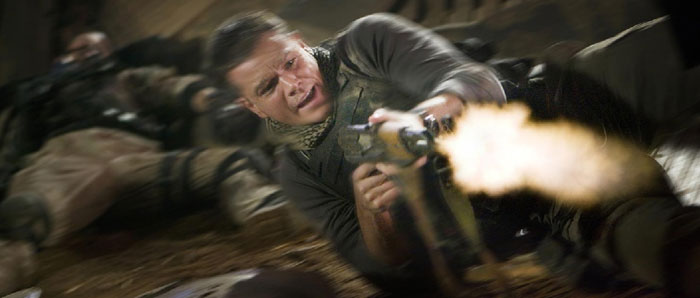
Movies: Green Zone
Dick Cheney’s going to have another heart attack.

The Pitch:
When the post-invasion search for weapons of mass destruction in Iraq turns up more dead ends than it does deadly chemicals, the leader of an Army unit tasked with finding them (Matt Damon) begins sniffing out clouds of smoke surrounding the fire of flawed intelligence that formed the basis for war. His operational jihad puts him at odds with an administration aide (Greg Kinnear), who attempts to draw a smiley face on the mess by silencing dissidents, manipulating the media, and even commanding his own strike force.
Direct Hits:
The movie puts viewers on a war footing from minute one, authentically depicting the tracer fire, scattershot explosions and hostage smash-n-grabs that won us the Iraq war in a weekend. Throughout its tidy 115-minute running time, the action is furious, procedural and even personal, thanks to Greengrass’s preference for handheld cameras. But it’s the portrayal of interdepartmental rivalries within the executive branch that has earned this movie the thriller tag. Intrigue builds and tensions mount as Damon shakes down CIA operatives (Brendan Gleason), journalists (Amy Ryan), and locals (Khalid Abdalla) for intel in a conflict that increasingly becomes “us versus us” instead of “us versus them.”
Misfires:
Imagine an ultra-realistic World War II movie about America’s Supreme Commander in the Pacific, only his name is Shmouglas ShmacArthur and he turns out to be Japanese. Now you know how confusing the blurred lines separating fact from fantasy in this film can be. The main players are fictional, but have real-world corollaries: WMD cheerleader Lawrie Dayne =
New York Times columnist Judith Miller; Iraqi exile Ahmed Zubaidi = Iraqi National Congress leader Ahmad Chalabi; Fox News-televised victory monkey = President George W. Bush. With hypothetical plot developments unfolding alongside real ones, it’s often hard to tell when Greengrass is being a storyteller and when he’s being a documentarian. Tip: assume every plot point that rings unfamiliar is fictional and this shouldn’t be a problem. (Warning: tip doesn’t apply to Gleason’s American accent.)
Why does this movie hate America?
The overriding message in
Green Zone regards the importance of our reasons for going to war. It’s at times implausible and heavy-handed, but thrillers need villains and it’s not like the Ba’ath Party had an exclusive license on ‘em. If you’re the type who can’t admit that the U.S. has ever made a mistake, that
Twilight guy is in another movie out this week.












